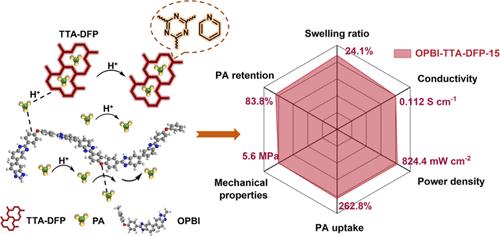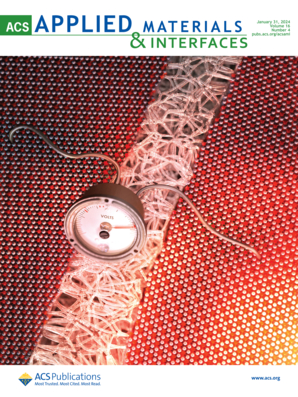富氮共价有机框架复合高温质子交换膜具有超低体积膨胀和减少磷酸泄漏的特性
IF 8.3
2区 材料科学
Q1 MATERIALS SCIENCE, MULTIDISCIPLINARY
引用次数: 0
摘要
磷酸(PA)泄漏和体积膨胀是限制高温质子交换膜燃料电池中掺杂 PA 的聚苯并咪唑(PBI)长期稳定运行的关键因素。增强聚合物基体与 PA 之间的相互作用为最大限度地减少 PA 损失和抑制膜过度膨胀提供了有效途径。共价有机框架(COFs)具有框架坚固、结构可调、与聚合物相容性好等特点,有助于提高 PA-PBI 膜的性能。在这项工作中,我们在室温下合成了名为 TTA-DFP 的多孔 COF,其中含有三嗪环和吡啶基,合成时间最短为 2 小时,且不隔氧。然后将 TTA-DFP 与商用聚[2,2′-(对-氧化二苯基)-5,5′-苯并咪唑](OPBI)混合,制备出复合膜。TTA-DFP 中丰富的碱性 N 位点与 PA 和 OPBI 具有很强的相互作用,不仅提供了更多的质子传输途径以促进质子传导,而且还将 PA 固定在亲酸性微孔中以减少 PA 的泄漏。复合膜的体积膨胀率远低于 OPBI 膜。在 80 °C 和 40% 相对湿度条件下处理 120 小时后,复合膜的 PA 保留率高达 84.6%。特别是,掺杂了 15 wt% TTA-DFP 的复合膜在 180 °C 无加湿条件下的质子传导率达到了 0.112 S cm-1,膨胀比为 24.1%。此外,它在 180 °C 时的最佳峰值功率密度为 824.4 mW cm-2,是 OPBI 膜的 1.7 倍。当电流密度为 0.3 A cm-2 时,复合膜在 140 °C 下可持续 120 小时,其稳定性远高于 OPBI 膜。本文章由计算机程序翻译,如有差异,请以英文原文为准。

Nitrogen-Rich Covalent Organic Frameworks Composited High-Temperature Proton Exchange Membranes with Ultralow Volume Expansion and Reduced Phosphoric Acid Leakage
Phosphoric acid (PA) leakage and volume expansion are critical factors limiting long-term stable operation of PA-doped polybenzimidazole (PBI) for high-temperature proton exchange membrane fuel cells. Enhancing the interaction between the polymer matrix and PA provides an effective way to minimize PA loss and inhibit excessive membrane swelling. The covalent organic frameworks (COFs) are helpful in improving the performance of PA-PBI membranes due to the robust frameworks, adjustable structures, and good compatibility with polymers. Here, in this work, we synthesized porous COFs named TTA-DFP containing triazine rings and pyridine groups at room temperature for as short as 2 h without oxygen isolation. TTA-DFP was then blended with commercial poly[2,2′-(p-oxidiphenylene)-5,5′-benzimidazole] (OPBI) to prepare composite membranes. The abundant alkaline N sites in TTA-DFP exhibit strong interactions with PA and OPBI, which not only provide more proton transport pathways to promote proton conduction but also immobilize PA in acidophilic micropores to reduce PA leakage. The composite membranes exhibit a much lower volume swelling ratio than that of the OPBI membrane. The PA retention of the composite membrane after 120 h of treatment at 80 °C and 40% relative humidity can reach as high as 84.6%. Particularly, the proton conductivity of the composite membrane doped with 15 wt% TTA-DFP achieves 0.112 S cm–1 at 180 °C without humidification with a swelling ratio of 24.1%. In addition, it has an optimal peak power density of 824.4 mW cm–2 at 180 °C, which is 1.7 times that of the OPBI membrane. The stability of the composite membrane is much better than that of OPBI at a current density of 0.3 A cm–2 at 140 °C for 120 h.
求助全文
通过发布文献求助,成功后即可免费获取论文全文。
去求助
来源期刊

ACS Applied Materials & Interfaces
工程技术-材料科学:综合
CiteScore
16.00
自引率
6.30%
发文量
4978
审稿时长
1.8 months
期刊介绍:
ACS Applied Materials & Interfaces is a leading interdisciplinary journal that brings together chemists, engineers, physicists, and biologists to explore the development and utilization of newly-discovered materials and interfacial processes for specific applications. Our journal has experienced remarkable growth since its establishment in 2009, both in terms of the number of articles published and the impact of the research showcased. We are proud to foster a truly global community, with the majority of published articles originating from outside the United States, reflecting the rapid growth of applied research worldwide.
 求助内容:
求助内容: 应助结果提醒方式:
应助结果提醒方式:


